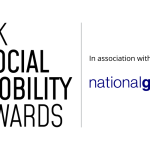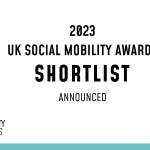Over the past year, the COVID-19 pandemic has affected every aspect of live in the UK in many ways; and social mobility is no exception.
The first few weeks of 2021 has seen many new reports and publications from several social mobility pioneers and Government branches, who have reported on the impact of the pandemic, and subsequent lockdowns, on the advancement of social mobility across the UK. This news has been both positive and negative. Here is a recap of a few of the things that have happened in the social mobility sphere over the past few weeks:
Impetus Youth Jobs Gap report:
A round–up of the Youth Jobs Gap series reports from Impetus, published earlier this month, highlights that our most disadvantaged young people are being left even further behind at an educational and career level due to the COVID-19. They have found a disparity between those with better qualifications, and those without, in accessing job opportunities, as “29% of young people without level 2 qualifications (GCSE equivalent) by age 18 were NEET (Not in Education, Employment or Training). Only 15% of young people with those qualifications were NEET. For young people with level 3 qualifications (A level equivalent), this figure drops to 8%.” This report shows how our endeavours in advancing social mobility need to be pushed further.
Full report here.
Sutton Trust – Learning in Lockdown report:
During the pandemic, the barriers to accessing education have been magnified – the impact is highlighted in the recent report by Sutton Trust, ‘Learning in Lockdown’. This report showcases that, since the first lockdown in March 2020, schools and students have better adapted to working remotely, however there are still significant gaps between those students who are socio-economically disadvantaged and those who are not. This only shows the attainment gap persists and has increased during remote learning, emphasising the risk that all the work that has been done in the social mobility sphere could be undone in just a short time.
To read the full report, click here.
Skills for jobs White Paper:
In July 2020, the Government pledged £2 billion towards an initiative for socio-economically disadvantaged 16–24-year-olds, setting out to increase their access to jobs. The recent Skills for Jobs White Paper, published by the Department for Education, proposed to invest in reforms into Further Education and skills training for young people, giving them a better chance to succeed. As the aforementioned reports have underlined the widening of the youth jobs gap, suggesting that disadvantaged young people are being left behind, these planned reforms come at a crucial time. Whilst the report focuses on post-16 further education and skills development, it has a considerable amount of information on the proposed plans – to read more, click here.
Joseph Rowntree Foundation – UK Poverty report:
Another timely report is the 2020/21 edition of the Joseph Rowntree Foundation’s annual UK Poverty Report. This important piece of research shows the devasting impact that the COVID-19 pandemic has had on the most vulnerable in our society – those effectively at risk of being trapped in poverty. The report also implies that due to other factors, e.g., Brexit, the ramifications of this could worsen, meaning that this needs to be a point of focus for our mission to ensure this doesn’t get any worse.
Check out the report here.
Centre for Cities – Urban Britain report:
As the Prime Minister has promised to ‘level up’ the economy, Centre for Cities has brought out their annual review of the state of Urban Britain. Whilst some areas of the country have managed to adopt a new ‘normal’ during the COVID-19 pandemic, this report suggests that some cities could be at risk of ‘levelling down’ instead, especially those dependent on trade industries who have been hit the hardest and are facing a variety of challenges. As the report continues, it is clear to see the negative impact that COVID-19 will continue to have on social mobility across the country if the suggested changes are not considered.
Check out the report here.
Key dates for the SOMOs:
Whilst we haven’t touched upon every vital point of conversion on social mobility, these are a few of the main things to think of. As well as these new reports, the UK Social Mobility Awards have just announced some of the key dates in the #SOMO2021 – with the nomination entries opening in just a few months on 26th April 2021. To see the key dates, click here.
We cannot wait to see what amazing work people have been doing over the last year, despite the drawbacks of the pandemic, in their fantastic efforts to improve social mobility in the UK.





